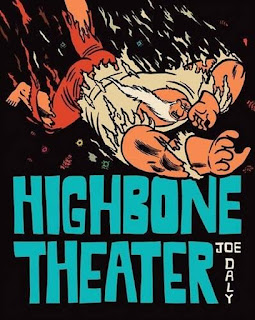Whatever it is is, it's big: 2016's Highbone Theater is nearly six hundred pages long, though Daly's style is fairly stripped down and quick here, with mostly just three to five big squared-off panels to a page. So it reads more quickly than that page count implies.
Like a lot of Daly's earlier work (the short stories in Scrublands, the longer, semi-detective stories in The Red Monkey Double Happiness Book), it's about young slackers in South Africa: men with jobs that aren't careers and friends they don't like that much and substances (beer and weed and odder things) they like to use maybe more than they should. Highbone is more realistic at core than Daly's earlier work, though: it's not set in a fantasy world like the Dungeon Quest series, there's no detective-style hijinks, and the intrusions of visionary colors and characters can mostly be explained by those substances I mentioned.
Mostly. The ending can't, but this is a big book - it's a long way to the ending.
The other big difference is that Highbone focuses on one main character, not a group or duo. Eric Palmer is central here, another one of Daly's over-muscled figures with a small head; his bald head and long white beard make him look several decades older than he's supposed to be.
Palmer - even his parents call him Palmer, which is an odd touch - is a seeker, a would-be profound guy, someone looking for meaning and deep connection in a shallow and surface-y world. His closest friends are the two bros Perry and Brewster, the very shallowest of men, who Palmer has really nothing in common with. We don't know why he's friends with them, how it came about, but we assume they're old friends, from school or the neighborhood or whatever. Palmer also spends a lot of time with Billy Boy, his co-worker at the paper factory, who is a massive conspiracy theorist of the oddest and weirdest type.
Highbone, I guess, is about those two poles of Palmer's life: the beer-swilling womanizing thoughtless good-time-seeking of Perry and Brewster versus the hermetic twisted drug-fueled search for a central meaning of everything of Billy. Both sides are caricatures; both seem silly and unreasonable from the outside. It's not clear if they seem that way to Palmer; he's a bit of an innocent, for all his mysticism and drug experimentation.
Daly doesn't put us directly into Palmer's head, but he is a guy who thinks out loud - to himself, while experiencing altered states, and to others, often at too great length and on subjects those others are not particularly interested in.
As usual with Daly, Highbone isn't all that plotty: things happen, times go on, and Palmer experiences events, but it's all a vague now, and those moments don't directly add up to anything. He goes shark fishing with Perry and Brewster at the beginning; he moves into an apartment; he works and chats with those guys and has a few faltering dates with a woman named Raquel.
He also takes drugs and has visionary experiences - some immediately after taking drugs, some that seem to be dreams, since we see him waking up afterward. Daly doesn't make the connections obvious, but his visions are clearly influenced by his life - and they will become more than visions by the ending.
The ending would be out of left field from anyone but Daly, with the "real world" validating both the conspiracy theories and the visions, leaving Palmer in a very different place and what seems to be several years later.
I found the conspiracy theories distracting - maybe they're supposed to be valid within the world of this book, but they're not just wrong, but crazy wrong, the kind of things only people with serious mental issues would believe. Little men who secretly run things from inside the earth is one thing; I can take that in fiction. Bizarre 9/11-was-faked ideas, though, aren't something I can stomach at all; I was in Manhattan that day.
I'm hoping for more books from Daly, especially given his long quiet period since this book, but Highbone made me think he's strongest when he's using genre-fiction ideas - fantasy, detectives, whatever - to manage and organize his visionary flights, instead of trying to start from the ostensibly "real" world. Highbone does a lot of things well and has a power in its heft and sweep, but parts of it are badly conceived or just don't quite cohere in the end.

No comments:
Post a Comment